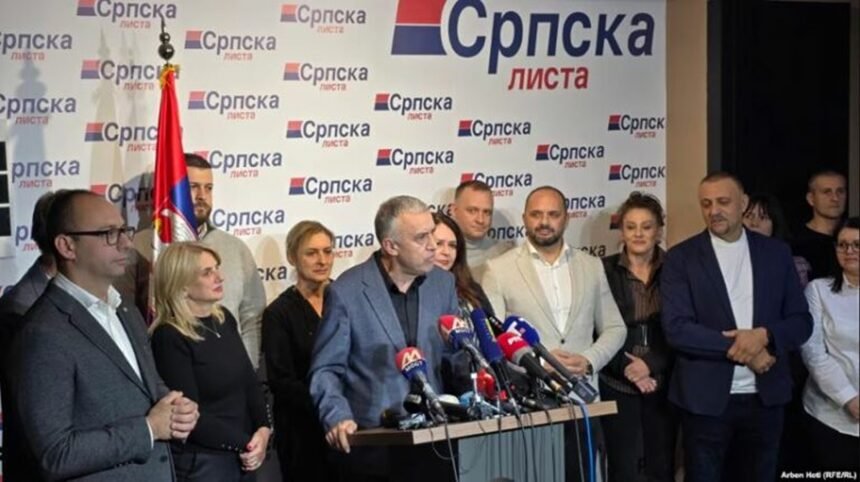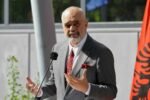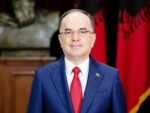“This is a victory of the Serbian people, of Serbian unity and solidarity,” declared the Serb List after claiming victory in the first round of local elections in nine out of ten Serb-majority municipalities in Kosovo.
However, the Serb List lost part of its support compared to the 2021 local elections.
The decline was influenced by the emergence of new Serbian candidates in several municipalities.
According to analysts, Serbian President Aleksandar Vučić is using the Serb List’s electoral win to maintain his political influence—both in Kosovo and within Serbia itself.
📊 Preliminary Results and Trends
According to preliminary results from the Central Election Commission, Klokot is the only Serb-majority municipality heading to a second round of voting — a situation identical to the 2021 elections.
Yet, when compared to 2021, support for the Serb List has noticeably declined in most Serb-majority municipalities, especially in North Mitrovica, where the party received 60% of votes on Sunday — down from 91% in 2021.
This time, voters in North Mitrovica could choose among six additional Serbian candidates, creating a more competitive field.
📍 Comparison of Serb List Results (2021 vs. 2025)
- Leposaviq: 70% (2025) | 97% (2021)
- Zubin Potok: 70% (2025) | 83% (2021)
- Zveçan: 86% (2025) | 98% (2021)
- Graçanica: 62% (2025) | 77% (2021)
- Ranillug: 71% (2025) | 100% (2021)
- Novobërdë: 63% (2025) | 62% (2021)
- Shtërpcë: 59% (2025) | 59% (2021)
- Partesh: 89% (2025) | 75% (2021)
- Klokot: Goes to runoff
In Graçanica, for the first time, an Albanian candidate, supported by all Albanian parties, participated—partially affecting the Serb List’s performance.
🗣️ Analysts’ Views
Belgrade-based political scientist Ognjen Gogiq told Radio Free Europe that this election marked a shift, as Serbs in Kosovo had alternatives to the Serb List in every municipality — unlike in past elections.
This, he said, contributed to the drop in support.
As alternatives to the Serb List, the election featured:
- The Party for Freedom, Justice and Survival (Nenad Rašić),
- Serbian Democracy (Aleksandar Arsenijević),
- Serbian National Movement (Milija Biševac),
- Alliance of Kosovo (Goran Marinković),
- and several citizen initiatives.
“If there had been no decline in support, these groups wouldn’t have gotten votes. The fact that new movements emerged shows a new mindset, a new mood, and the need for an alternative,” Gogiq explained.
He added that support for the Serb List shouldn’t be mistaken for approval of its political conduct — rather, it reflects a desire among Kosovo Serbs to retain control in local municipalities and preserve ties with Belgrade.
🧩 The Larger Picture
According to preliminary CEC data, the Serb List still secured the majority of municipal assembly seats, though other parties managed to win some council positions as well.
Analyst Dušan Janjić, from the Belgrade Forum for Ethnic Relations, argued there’s no real alternative to the Serb List, saying that other parties’ results represent “the maximum they can achieve.”
He described the Serbian community in Kosovo as living under a form of “non-party pluralism,” a term once used by Slobodan Milošević to describe the dominance of a single party, which effectively blocks political pluralism.
Janjić added that the international community tolerates the Serb List’s monopoly, even turning a blind eye to collective voting practices.
“Where in Europe is it acceptable for people to enter polling stations in groups of three? Let Peter Sørensen [the EU envoy for Kosovo-Serbia dialogue] explain that to me,” he said.
🇷🇸 What the Serb List’s Victory Means for Vučić
President Aleksandar Vučić was the first to announce the Serb List’s victory in nine Serb-majority municipalities, emphasizing that Klokot would go to a runoff.
In a phone call with Serb List officials on Sunday, Vučić said:
“We made it — they cannot erase the Serbian name and identity.”
Later, at a press conference, the Serb List publicly thanked Vučić for his support.
According to Janjić, Vučić’s message was clear: that he himself “won” the elections in Serb-majority Kosovo municipalities, sending a signal to the international community that he remains a key player.
“At this point, Vučić needs to focus on normalizing relations [with Kosovo] to consolidate his rule in Serbia. He needs that card — it’s extremely important,” Janjić stated.
Gogiq also pointed out that Vučić had personally announced Serb List results in the February 9 parliamentary elections, arguing that such actions are meant primarily for domestic audiences in Serbia, to show that his policies are “delivering results” despite internal challenges such as student protests and Western sanctions.
Nonetheless, Gogiq suggested that the Serb List’s return to Kosovo’s political institutions could contribute to normalization efforts, since both the party and Belgrade have recently sent constructive messages about re-engagement.
A day after the elections, the head of Serbia’s Office for Kosovo, Petar Petković, said the Serb List’s win “proves that the Serbian people have a future” and that the party “guarantees the survival of Serbs in Kosovo.”
He told Pink TV that the victory symbolizes “the return of Serbs to their municipalities in northern Kosovo.”
Official Belgrade had supported the Serb List’s withdrawal from Kosovo institutions in November 2022, but President Vučić called for their return in September 2024.
📍 Source: Radio Free Europe







